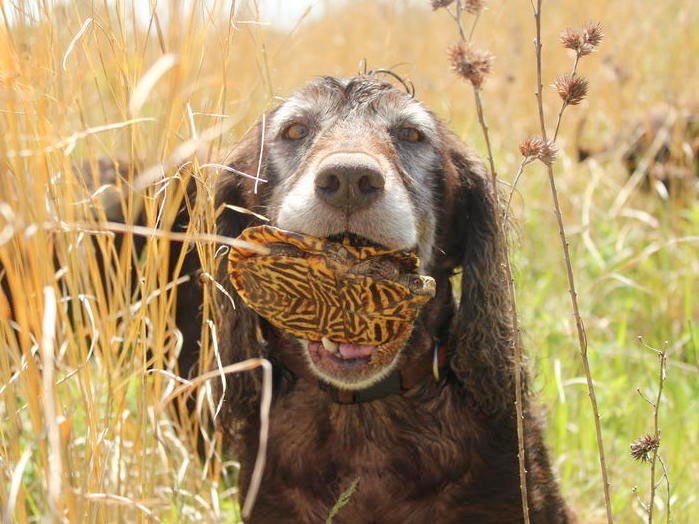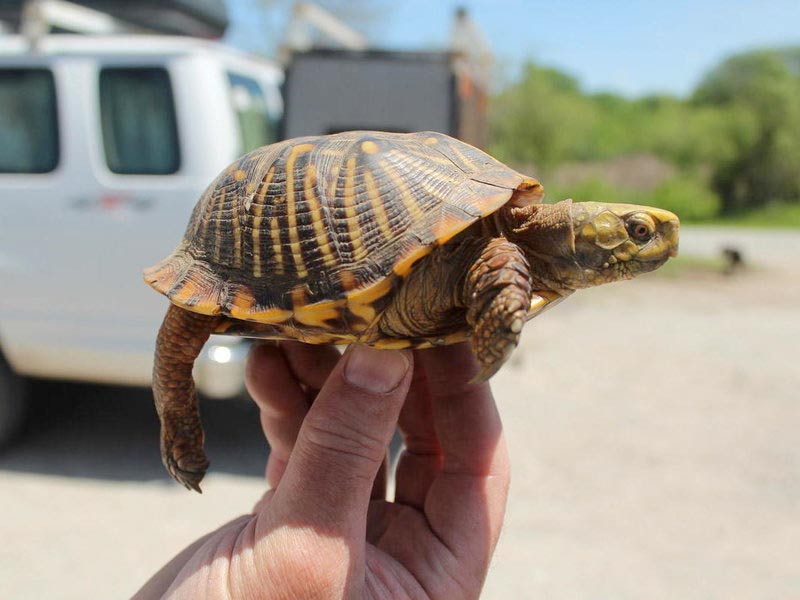 A team of specially trained hunting dogs has been helping conservationists and researchers find rare turtles in Iowa.
A team of specially trained hunting dogs has been helping conservationists and researchers find rare turtles in Iowa.As human activities are increasingly threatening animal species, scientists say turtles are at a significant risk because of climate change. In Iowa, conservationists are taking an unconventional approach to finding and protecting turtles, with an unlikely helper.
A retired schoolteacher has trained his hunting dogs to find the reptiles for researchers. Counting the creatures will help conservationists manage the land better.
It's a cool spring morning on a 40-acre nature preserve owned by Bur Oak Land Trust in eastern Iowa. John Rucker is scouring a shady hillside with his four Boykin spaniels, looking for turtles.
"Find turtle, find turtle," Rucker calls to his dogs. Turning to a reporter, he says: "Did I tell you I'm the only person in the world that does this?"
In fact, there are a number of conservationists and their canine companions doing similar work (though Rucker may be one of the few who live out of tents and vans while working).
When he's not living off the grid in rural Montana, Rucker travels the country with his specially trained hunting dogs, helping scientists and conservationists find turtles.
The dogs working with Rucker are Rooster, Jenny Wren, Jaybird and Mink.
Rucker and his "super dogs," as he calls them, make their way through the undergrowth, checking in brush piles and under old logs. When the dogs find a turtle, they'll gently pick it up with their mouth and bring it back to Rucker.
"You will notice that as soon as they strike a scent trail their tails will start wagging furiously, and then their whole demeanor becomes extremely excitable," Rucker explains.
Citizen conservationist Judy Felder is one of the volunteers out hunting today.
"It's sort of like a religion for me," Felder says. "Nature is important and somebody has to defend it, protect it, preserve it."
Today the group is looking for ornate box turtles — they're about 4 to 5 inches across with yellow markings.
"It's just wonderful to hold one. They're gorgeous; they're absolutely gorgeous," Felder said. "The feel of their shell is ... I really hope we find one."
 A team of specially trained hunting dogs has been helping conservationists and researchers find rare turtles in Iowa.
A team of specially trained hunting dogs has been helping conservationists and researchers find rare turtles in Iowa.Ornate box turtles are a remnant species of the country's vast prairies, where they co-evolved with wild bison. When European settlers turned the grasslands into farms, the turtles lost nearly all of their habitat. Now they're considered threatened in Iowa.
"We try to manage our properties with the most vulnerable species in mind, and these turtles are the most vulnerable species," says Jason Taylor, a property stewardship specialist with the Bur Oak Land Trust.
Taylor hopes to restore this site to what it looked like pre-settlement — a sunny, open grassland dotted with oak trees and periodically burned by prairie fires. Knowing more about the turtle population will help him decide how to best manage the land to preserve their habitat.
"There are a number of things that we're going to do simply because we have known presence of these turtles. As opposed to on other properties, we'd be able to mow, we'd be able to burn during growing season, we'd be able to do all these additional things," Taylor says.
But first the team has to find the turtles. At a sunnier stretch of prairie a few miles away, Rucker once again lets the dogs off-leash and they run through the prairie grasses, looking for turtles.
"Find turtle, find me a turtle," Rucker calls to the dogs.
It's a beautiful, clear day and the dogs are on a roll.
After rooting through a thicket of trees in the middle of the prairie, one of the dogs emerges with a turtle grasped squarely in its mouth.
"Hey we got a turtle! That dog's got one!" Rucker calls. "Good girl, Mink! Come on girlie."
Volunteers scoop the turtles up and check for ID markers. Cornell College biology professor Andy McCollum and his students Lizzy Ott and Lily Ullenius are here to track the turtles and hold on to some for further research. Over three days, the dogs find a total of 137 turtles.
While this may seem like a lot of effort for a relatively minor species, they're all intertwined. Rucker says species provide habitat and food for each other and slow the spread of pests and diseases.
It's all too easy to upset that balance.
Seeing ecosystems regain that biodiversity is breathtaking, Rucker says. He tells me about looking out on a stretch of prairie after a summer rainstorm.
"The smell of the tallgrass prairie was overpoweringly beautiful. To see the turtle dogs catching ornate box turtles within sight of a wild bison herd after a summer rainstorm was ..." Rucker trailed off. "It almost makes you want to just weep to think of all that we have lost and what it would've been like 200 years ago."
What's lost here in Iowa is the native prairie. With the help of Rucker and his turtle dogs, conservationists are trying to create a safe environment for this at-risk species.

By submitting your comments, you hereby give AZPM the right to post your comments and potentially use them in any other form of media operated by this institution.